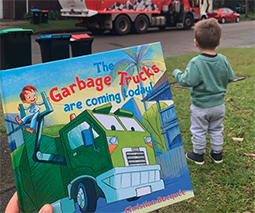Thumbs down: How to tackle your child’s thumb-sucking habit

One parent’s thumb sucking standoff with her child led her straight to mothercraft nurse Chris Minogue, as she quizzed the Kinderling Helpline expert on the best way to discourage this comforting habit.
“How to break the habit?”
Vicky’s 22-month-old daughter has been a dedicated thumb sucker since she was born. She “never took to dummies,” Vicky told Chris. “Do you have any suggestions on how to break the habit? Is it just a bad habit?”
“It is a habit, and some people say it’s genetic,” Chris explained, noting that most kids will grow out of thumb sucking at preschool or prep age. “The only way it’s going to end is via their maturity – and they don’t mature and understand the concept of not doing it until they’re 4 or 5.”
Read more about toddlers and preschoolers:
- Is your child’s tantrum ‘normal’ – or a sign of something more serious
- Scared to wee! What to do if your child won’t use the potty or toilet
- Is ‘cold turkey’ the best way to help your child ditch the dummy?
Setting boundaries
Putting some boundaries on this habit, rather than outlawing it altogether, is a great first step, Chris advises. At this age “tell them appropriate places to suck their thumb … You can suck your thumb in bed. You can suck your thumb at home,” she suggests.
Chris says parents’ worries about thumb sucking extend beyond whether the practice is age-appropriate or signals insecurity.
“I think the biggest problem that parents are worried about is the hygiene of sucking the thumb, let alone the dental problems that could happen, long term.”
Long-term thumb sucking can lead to issues like:
- an overbite
- an open bite – when the top and bottom teeth don’t meet
- speech issues – due to thumb or fingers moving the teeth from their usual position

Gently does it
It’s important to tackle your child’s dependence on this habit sensitively – and with patience.
The child needs to “actually understand [that you’d like them to drop this habit] and often I find that they do that between four and five because their hands are busy all the time. They might be drawing or colouring in or doing craft or building. And they literally forget to suck their thumb,” Chris says.
Ways to break the thumb-sucking habit
If your child is old enough to understand that you’d prefer them not to suck their thumb, you can discourage the habit by:
- offering encouragement and praise when they don’t suck their thumb
- distracting them with an alternative – a toy or other comfort object
- set some boundaries around thumb sucking
- keeping their hands busy, as Chris suggests
- keeping a reward chart to mark occasions when they didn’t suck their thumb
- gentle reminders that we’re trying not to use thumb sucking for comfort
“I think you’re going to have to wait this one out and wait for maturity to come,” Chris suggested. “But you could put some gentle boundaries around where you feel it’s appropriate to suck their thumb.”









